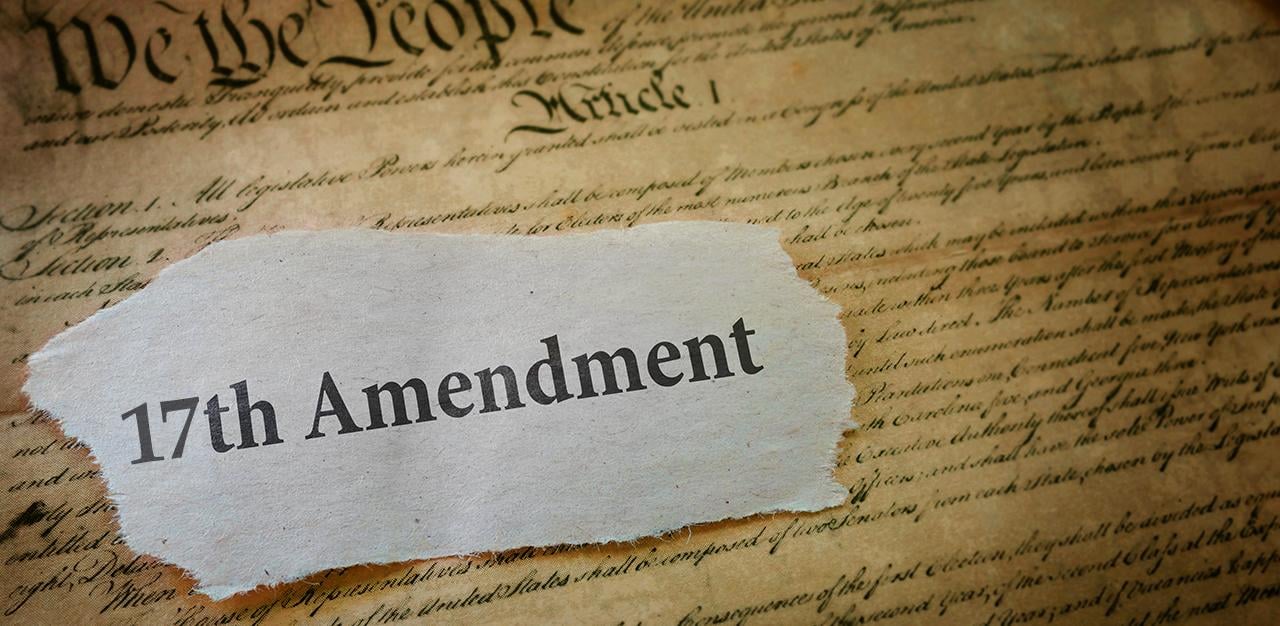
America’s legislative branch is a bicameral system meaning our United States Congress is divided into two separate chambers: 1) the U.S. Senate; and 2) the U.S. House of Representatives. The U.S. Senate is made up of two senators from each state, no matter the size of the state or the population. The House of Representatives, on the other hand, is made up of “no more than 435” (as provided by law), and the states elect members in a manner proportionally representing the population of the 50 states.
Article I, Section 3 of the Constitution which conferred the power to elect two U.S. Senators, to seats in the U.S. Congress, to state lawmakers. The first clause of this section states,
The Senate of the United States shall be composed of two Senators from each State, chosen by the Legislature thereof, for six Years; and each Senator shall have one Vote.
The Seventeenth Amendment, passed by Congress in May 1912 and ratified by the states on April 8, 1913, divested that authority out of the hands of state politicians and turned it over to the people of the states. The text of the Seventeenth Amendment states, in part,
The Senate of the United States shall be composed of two Senators from each State, elected by the people thereof, for six years; and each Senator shall have one vote. The electors in each State shall have the qualifications requisite for electors of the most numerous branch of the State legislatures…
The 180-degree about-face is straightforward. The underlying motivations for this course correction are multi-faceted, but were essentially four-fold, as follows:
First, in the years leading up to the Seventeenth Amendment, “several state legislatures deadlocked over the election of senators, which led to Senate vacancies lasting months and even years;”
Second, at the time the Seventeenth Amendment was ratified, members of the U.S. Senate were viewed by their constituents as out of touch with the people they purported to represent. Further, the U.S. Senate was seen as nothing more than a “‘millionaire’s club’ serving powerful private interests.”
Third, by the time the Seventeenth Amendment was ratified, 29 states had already enacted laws transferring the power to elect U.S. Senators to the residents of the states over concerns political corruption had taken refuge in their state legislatures; and
Fourth, America’s political landscape had changed dramatically during the 125 years since the Constitution was adopted; and by this time, special interest groups, lobbyists, the politically well-connected and degenerate political machines had gained a great deal of control over state legislatures, and therefore the Senators elected with their support were dismissed as puppets.
Ratification of the Seventeenth Amendment provided American citizens with the duty and privilege to hold their U.S. Senators accountable for actions, decisions, and conduct engaged in while in office. If our Republican form of government is to remain forever esteemed on the world stage, it will be through our voices and our votes.
We, at America’s Future, believe in free and fair elections and support the constitutional principle that America is self-governing, only by consent of “We the People.” Considering U.S. Senators are elected to serve in six-year increments, meaning triple the time members of the U.S. House of Representatives hold office, and two years longer than the four-year Presidential term, it is of utmost importance that the men and women who hold these offices and exercise great powers are accountable to the people they represent.







